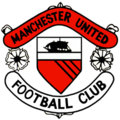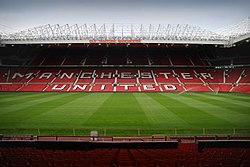History
Manchester United was formed in 1878 as Newton Heath LYR Football Club by the Carriage and Wagon department of the Lancashire and Yorkshire Railway depot at Newton Heath.The team initially played games against other departments and rail companies, but on 20 November 1880, they competed in their first recorded match; wearing the colours of the railway company – green and gold – they were defeated 6–0 by Bolton Wanderers' reserve team.By 1888, the club had become a founding member of The Combination, a regional football league. However, following the league's dissolution after just one season, Newton Heath joined the newly formed Football Alliance, which ran for three seasons before being merged with the Football League. This resulted in the club starting the 1892–93 season in the First Division, by which time it had become independent of the rail company and dropped the "LYR" from its name. After just two seasons, the club was relegated to the Second Division.
In January 1902, with debts of £2,670 – equivalent to £210,000 as of 2011 – the club was served with a winding-up order. Captain Harry Stafford found four local businessmen, including John Henry Davies (who became club president), each willing to invest £500 in return for a direct interest in running the club and who subsequently changed the name on 24 April 1902, Manchester United was officially born.Under Ernest Mangnall, who assumed managerial duties in 1903, the team finished as Second Division runners-up in 1906 and secured promotion to the First Division, which they won in 1908 – the club's first league title. The following season began with victory in the first ever Charity Shield and ended with the club's first FA Cup title. Manchester United won the First Division for the second time in 1911, but at the end of the following season, Mangnall left the club to join Manchester City.
In 1922, three years after the resumption of football following the First World War, the club was relegated to the Second Division, where it remained until regaining promotion in 1925. Relegated again in 1931, Manchester United became a yo-yo club, achieving its all-time lowest position of 20th place in the Second Division in 1934. Following the death of the club's principal benefactor, J. H. Davies, in October 1927, the club's finances deteriorated to the extent that Manchester United would likely have gone bankrupt had it not been for James W. Gibson, who, in December 1931, invested £2,000 and assumed control of the club.In the 1938–39 season, the last year of football before the Second World War, the club finished 14th in the First Division.
 Manchester United badge in the 1960s
Manchester United badge in the 1960sManchester United Football Club is an English professional football club, based in Old Trafford, Greater Manchester, that plays in the Premier League. Founded as Newton Heath LYR Football Club in 1878, the club changed its name to Manchester United in 1902 and moved to Old Trafford in 1910.
In 1968, under the management of Matt Busby, Manchester United was the first English football club to win the European Cup, ten years after the Munich air disaster that claimed the lives of eight players. The current manager, Alex Ferguson, is the most successful manager in the club's history, having won 26 major honours since he took over in November 1986.
Having won 18 league titles, four League Cups and a record 11 FA Cups,Manchester United is one of the most successful clubs in the history of English football. The club has also won three European Cups and is unique in having won a Premier League, FA Cup and UEFA Champions League Treble, in the 1998–99 season.
Manchester United is one of the wealthiest and most widely supported football teams in the world.The club is said to be worth £1.19 billion, making it the most valuable football club in the world.After being floated on the London Stock Exchange in 1991, the club was purchased by Malcolm Glazer in May 2005 in a deal valuing the club at almost £800 million.
Ferguson years (1986–present)
Main article: History of Manchester United F.C. (1986–present)Alex Ferguson and his assistant Archie Knox arrived from Aberdeen on the day of Atkinson's dismissal,and guided the club to an 11th-place finish in the league.Despite a second-place finish in 1987–88, the club was back in 11th place the following season.Reportedly on the verge of being dismissed, victory over Crystal Palace in the1990 FA Cup Final replay (after a 3–3 draw) saved Ferguson's career.The following season, Manchester United claimed its first Cup Winners' Cup title and competed in the 1991 UEFA Super Cup, beating European Cup holdersRed Star Belgrade 1–0 in the final at Old Trafford. A second consecutive League Cup final appearance followed in 1992, in which the team beat Nottingham Forest 1–0 at Wembley.In 1993, the club won its first league title since 1967, and a year later, for the first time since 1957, it won a second consecutive title – alongside the FA Cup – to complete the first "Double" in the club's history.
Support :Manchester United is reputed to be the most popular football club in the world, with the highest average home attendance in Europe.The club's worldwide fan base includes more than 200 officially recognised branches of the Manchester United Supporters Club (MUSC), in at least 24 countries.The club takes advantage of this support through its worldwide summer tours. Accountancy firm and sports industry consultants Deloitte estimate that Manchester United has 75 million fans worldwide,while other estimates put this figure closer to 333 million.Supporters are represented by two independent bodies; the Independent Manchester United Supporters Association (IMUSA), which maintains close links to the club through the MUFC Fans Forum,and the Manchester United Supporters' Trust (MUST). After the Glazer family's takeover in 2005, a group of fans formed a splinter club, F.C. United of Manchester. The West Stand of Old Trafford – the "Stretford End" – is the home end and the traditional source of the club's most vocal support.Sponsorship
In an initial five-year deal worth £500,000, Sharp Electronics became the club's first shirt sponsor at the beginning of the 1982–83 season, a relationship that lasted until the end of the 1999–2000 season, when Vodafone agreed a four-year, £30 million deal.Vodafone agreed to pay £36 million to extend the deal by four years, but after two seasons triggered a break clause in order to concentrate on its sponsorship of the Champions League.To commence at the start of the 2006–07 season, American insurance corporation AIG agreed a four-year £56.5 million deal which in September 2006 became the most valuable in the world.At the beginning of the 2010–11 season, American reinsurance company Aon became the club's principal sponsor in a four-year deal reputed to be worth approximately £80 million, making it the most lucrative shirt sponsorship deal in football history.The club's first kit manufacturer was Umbro, until a five-year deal was agreed with Admiral Sportswear in 1975. Adidas received the contract in 1980,before Umbro started a second spell in 1992.Umbro's sponsorship lasted for ten years, followed by Nike's record-breaking £302.9 million deal that will last until 2015; 3.8 million replica shirts were sold in the first 22 months with the company.In addition to Nike and Aon, the club also has several lower-level "platinum" sponsors, including Audi and Budweiser.
Old Trafford
Theatre of Dreams 
Location Sir Matt Busby Way,
Old Trafford,
Greater Manchester,
England Broke ground 1909 Opened 19 February 1910 Owner Manchester United Operator Manchester United Construction cost £90,000 (1909) Architect Archibald Leitch (1909) Capacity 75,957 seated[2] Tenants Manchester United (1910–present)
Manchester United

Full name Manchester United Football Club Nickname(s) The Red Devils Founded 1878, as Newton Heath LYR F.C. Ground Old Trafford
(Capacity: 75,957) Owner Glazer family Co-chairmen Joel & Avram Glazer Manager Alex Ferguson League Premier League 2009–10 Premier League, 2nd Website
Support :

Old Trafford,
Greater Manchester,
England

(Capacity: 75,957)


Tidak ada komentar:
Posting Komentar